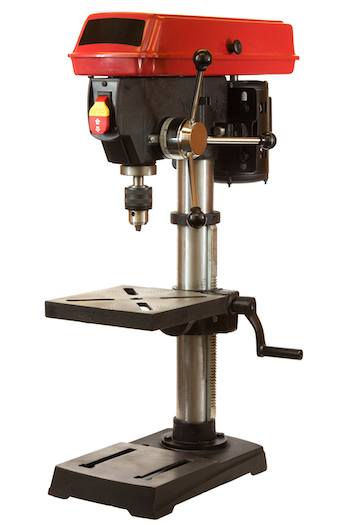We may earn revenue from the products available on this page and participate in affiliate programs. Learn More ›
The controls vary from one drill press to the next, but there are a number of elements that remain largely the same.
Read and follow the instructions provided by the manufacturer of your drill press. The drill should be unplugged while you are setting it up for use.
Set the Speed.
The speed on most drill presses is adjusted by moving the drive belt from one pulley to another. In general, the smaller the pulley on the chuck axis, the faster it spins. A rule of thumb, as with any cutting operation, is that slower speeds are better for drilling metal, faster speeds for wood. Again, consult your manual for the manufacturer’s recommendations.
Fit the Bit.
Open the chuck, slide in the bit, snug the chuck by hand around the bit’s shaft, then tighten the chuck’s three jaws with the key. Make sure to remove the chuck. If you don’t, it’ll become a dangerous projectile when you turn on the drill. When drilling large holes, drill a smaller, pilot hole first.

Adjust the Table.
Some models have a crank that adjusts the table height, others move freely once the clamping lever has been released. Set the table to the desired height for the operation you are to perform.
Gauging the Depth.
If you are simply drilling a hole in a piece of stock, you may not need to adjust the depth gauge, the threaded rod that controls the distance the spindle travels. However, if you are concerned with a stopped hole of a fixed depth, lower the bit to the desired height, and adjust the pair of knurled nuts on the depth gauge to the proper stopping point. One of them should stop the spindle; the other locks the first nut in place.
Secure the Workpiece.
Before operating your drill press, be sure that the workpiece to be drilled is fixed in place. The rotation of the drill bit may try to spin the wood or metal workpiece, so it must be clamped to the worktable, braced against the supporting column at the rear of the machine, or otherwise secured. Never operate the tool without firmly anchoring the workpiece.
Drilling.
Once the drill press setup has been completed, putting it to work is easy. Make sure the drill is spinning at full speed, then present the bit to the workpiece, lowering the bit by swinging the rotating lever. Once you’ve finished drilling the hole, release the pressure on the lever and its spring-loaded return mechanism will return it to its original position.


